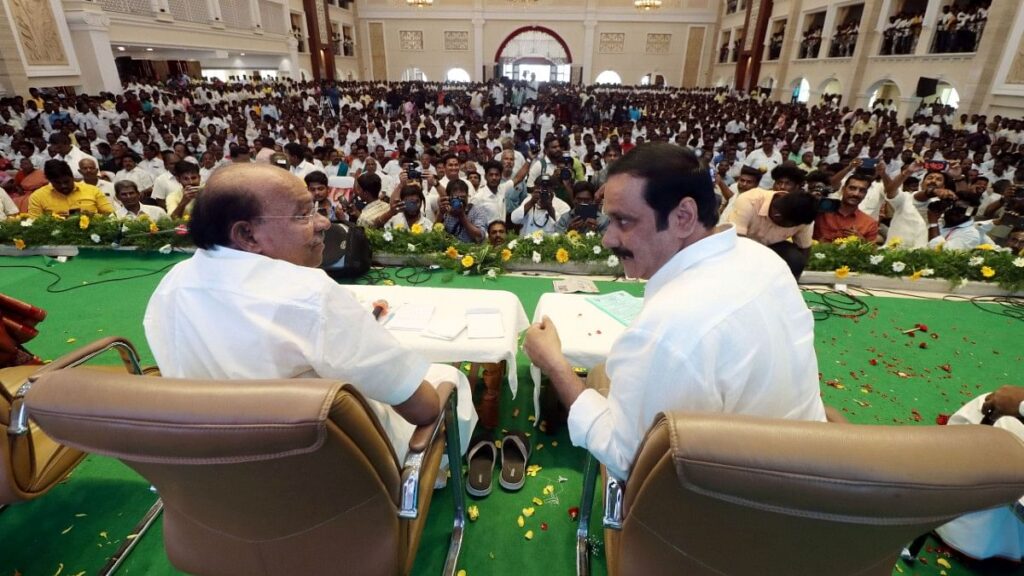Chennai: In a major setback to Pattali Makkal Katchi (PMK) founder S. Ramadoss, the Madras High Court dismissed the writ petition filed by the party’s general secretary Murali Shankar seeking to restrain Ramadoss’ son Anbumani from holding a general council meeting on Saturday (9 August) in Mahabalipuram in Kancheepuram district in Tamil Nadu.
The order comes after efforts by the Madras High Court judge Justice N. Anand Venkatesh to mediate and reconcile between Ramadoss Sr and his son Anbumani Ramadoss failed on 8 August evening.
In the midst of the growing tussle between PMK founder S. Ramadoss and his son Anbumani, the latter has called a general council meeting.
Terming it “illegal”, PMK general secretary Murali Shankar, who was appointed by founder S. Ramadoss, filed a petition before the Madras High Court to restrain the general council meeting.
When the petition came up for hearing on Friday morning, Justice N Anand Venkatesh asked the father and son to appear before him in his chamber for mediation.
“…Considering the fact that the founder of the party and 1st respondent (Anbumani) are father and son and they have worked together for a long time for the welfare of the party and people at large, this court thought it fit to attempt a mediation between the founder and the 1st respondent,” the order read.
While Anbumani appeared in person, Ramadoss appeared through video conference mode as he was unwell. But despite the efforts of Justice N. Anand Venkatesh, Ramadoss was not ready to talk to Anbumani.
“I made an attempt to mediate between the founder of the Party (S. Ramadoss) and the 1st respondent (Anbumani) to see if they could patch up their differences. In spite of best efforts, I found that the founder was not prepared to talk with Anbumani. Hence, I decided to hear the case on merits in my Chamber,” the order read
While the counsel representing general secretary Murali Shankar from Ramadoss camp argued that Anbumani’s tenure had ended, and his attempt to hold the meeting was illegal and in violation of the PMK’s by-laws, Anbumani’s counsel countered that the meeting was lawfully convened by the elected General Secretary and adhered to the party’s by-laws.
Anbumani’s counsel also argued that the dispute was an internal party matter, unsuitable for judicial intervention through a writ petition.
Upon hearing the argument from both sides, the Madras High Court held that the question of whether the General Body Meeting complied with the party’s by-laws was a private dispute and not suitable for adjudication in a writ petition.
“A private dispute between the father and the son can never be dealt with in a writ petition,” the order stated, emphasising that a writ petition was not maintainable against a private entity like the PMK unless it involved a public duty.
In its ruling, the court also described the conflict as an “unfortunate ego clash between the father and son,” which had led to a division within the PMK, with some members supporting Ramadoss and some backing Anbumani.
The court also dismissed the petitioner’s claim that the meeting could lead to a law and order problem, noting that police permission was not required for a closed-door political meeting.
“If at all any law and order problem is created, the police will handle the same and take action against the concerned persons in accordance with the law,” the order read.
(Edited by Viny Mishra)
Also read: ‘Can’t sit dummy & give party to son Anbumani,’ says Ramadoss as PMK feud reaches Madras HC

